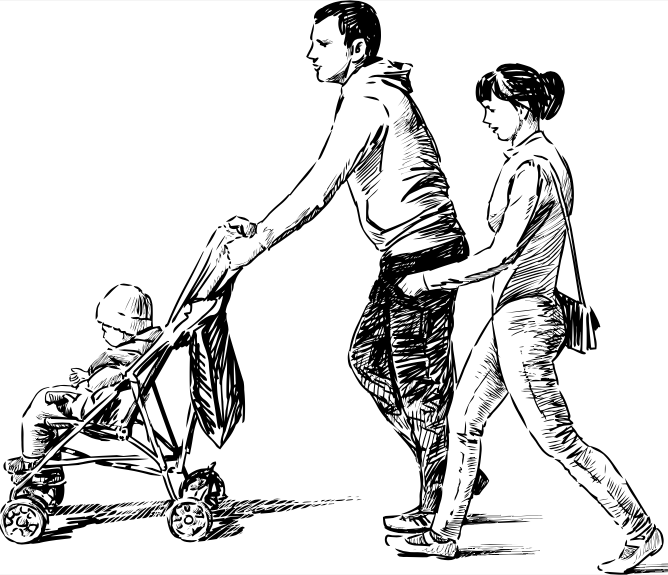Choosing a Legal Guardian for Your Children
When making a Will, most people focus on what will happen to their assets when they die. But if you have children, it’s also essential to consider who would care for them if you were no longer around. It’s possible to appoint a legal guardian for your children when you make your Will.
For initial advice about making a Will call our Will writers on 7380 813659
Making a Will when you have children
Most people would agree that their children are their most treasured possession. As a father myself, I certainly believe this to be true. Parents invest so much in their children both emotionally and financially that it’s understandable that they are the priority in a parent’s life.
With this being the case, it’s surprising that there are many parents in the UK with children under 18 who don’t have a Will in place. Granted, a Will is something that we hope won’t be needed for a very long time. Nevertheless, it’s a vital document which should be seen as an extension of the protection you give your children during your lifetime.
It’s natural when thinking about making a Will to immediately focus on money and making sure that your cash and property go to the right people. But what about your most treasured possession of all, your children?
It seems strange to refer to your children as possessions, but whilst they are under the age of 18, you are responsible for them. In law, this is often referred to as having Parental Responsibility.
These laws have evolved over time to recognise modern society and the fact that many children today are born to parents who aren’t married. There was a time, as recent as 2003, when an unmarried father wasn’t automatically recognised as having Parental Responsibility. However since December 2003, an unmarried father acquires this right provided he is named as the father on the child’s birth certificate.
Appointing a legal guardian in your Will
Parents who have Parental Responsibility can appoint a Legal Guardian to care for their children if they die while the child is under 18. The requirements for formally appointing a Legal Guardian is very similar to the requirements of putting a Will in place. For example, it needs to be in writing and signed in the presence of two witnesses. It’s for this reason that many people incorporate their choice of Legal Guardian within the terms of their Will.
So how do you choose the right Legal Guardian for your child? Well, firstly, it’s important to recognise that the guardianship appointment would only take effect if there was no one else alive who already has Parental Responsibility. So normally the terms of the guardianship appointment would state that it only takes effect if both parents have died.
The next step is to consider who, outside of the natural parents, would be most suitable. Sometimes this is an obvious choice. However, in a lot of instances it’s not so clear cut. I have sat with many clients over the years where this question has created tension in the room.
It’s therefore important that parents consider their options carefully. When acting for younger clients the first thought typically reverts to choosing their parents. This can cause clients to reflect on their own childhood and whether they would want to same for their children.
Another factor to consider is the existing relationship between the child and their grandparent. A further consideration is the age of the child and the grandparent. Whilst a grandparent may be able to cope looking after your child if you were to die in the next few years, would they still be able to in 10 years, when your child could be a teenager and they may be in their 70s or 80s?
It’s also common to look towards a sibling to appoint as Legal Guardian where possible. However there may be multiple siblings on both sides of the family – so how do you choose?
Firstly, you may want to consider whether the sibling would want the responsibility of raising your child. Being a parent isn’t for everyone. Also, do they already have children? If so, do you approve of the way they raise them? Would you be comfortable with your child potentially being raised in the same way, factoring in their religious or ethical beliefs?
There are also practical considerations to take into account, such as the geographical location of the proposed Guardian. Do they live in another part of the country? Think about the upheaval that could cause if your child has to relocate, move school and make new friends at a time when they have just lost their parent. Some people may want to choose a Guardian who lives abroad. Whilst it is possible to put this in your Will, the appointment may not take effect if the child is prevented from moving to the Guardian’s country because of immigration controls.
Unfortunately, for some, the choice isn’t easy. There’s no right or wrong answer, other than what you feel would be in the best interests of your child or children. The most important thing is that you don’t ignore it. The worst outcome is that you do nothing and leave your loved ones potentially arguing over what is in the child’s best interests. This could end up in Court with a Judge ultimately making the decision – which may not have been what you would’ve wanted.
Parents spend most of their lives trying to protect their children, so just think of making a Will and appointing a Legal Guardian as providing your children with some legal protection. Will writing isn’t very expensive with Co-op Legal Services and we will help you every step of the way.
None of us know what life has in store for us so it’s important to plan for the unexpected, particularly when it protects those we love the most.
Case Studies
Over the years, CKE Attorneys have helped hundreds of individuals and businesses up and down the country. Some of our success stories are below...
-
 Read MorePersonal InjurySlip, Trip or Fall Accidents in Public PlacesIf a member of the public gets injured in a slip, trip or fall accident in a public place, and reasonable steps hadn't been taken to make the area safe, the injured person may be entitled to make a public liability claim.
Read MorePersonal InjurySlip, Trip or Fall Accidents in Public PlacesIf a member of the public gets injured in a slip, trip or fall accident in a public place, and reasonable steps hadn't been taken to make the area safe, the injured person may be entitled to make a public liability claim. -
 Read MorePersonal InjuryWill Personal Injury Compensation Affect My Benefits?Receiving state benefits should not stop an injured person starting a claim for personal injury or medical negligence compensation.
Read MorePersonal InjuryWill Personal Injury Compensation Affect My Benefits?Receiving state benefits should not stop an injured person starting a claim for personal injury or medical negligence compensation. -
 Read MoreFamily LawClean Break Orders explainedA clean break order is used following a divorce and essentially means that each person's financial affairs are completely severed from the other's. Without a clean break order or a consent order from the court, your ex-spouse could make a financial claim against you at any time in the future.
Read MoreFamily LawClean Break Orders explainedA clean break order is used following a divorce and essentially means that each person's financial affairs are completely severed from the other's. Without a clean break order or a consent order from the court, your ex-spouse could make a financial claim against you at any time in the future.